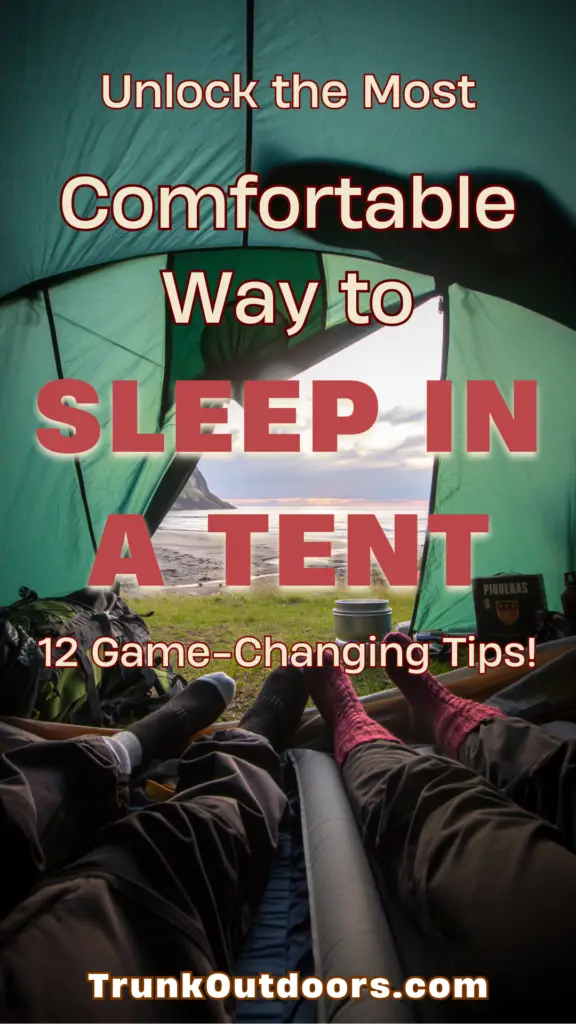12 Essential Tips for a Comfortable Sleep in a Tent
Wondering how to achieve the most comfortable way to sleep in a tent while camping? Many campers underestimate the importance of a good sleeping setup. Instead of lying directly on the cold, hard ground, consider these essential tips to ensure a relaxing night and a refreshed morning!
When it comes to camping, your sleeping comfort is crucial. Here are essential items and strategies to help you sleep well in your tent, allowing you to enjoy nature without sacrificing restful sleep.
Disclosure: Some links below are affiliate links, which means I may earn a commission at no extra cost to you if you make a purchase.
Don’t forget to pin this post for later!


1. Choose the Right Tent for Maximum Comfort
Your tent’s design can significantly affect your sleep quality. Opt for a tent with room darkening walls to block out outside light, making it easier to fall asleep and stay asleep. If you’re camping with friends or family, a spacious tent will prevent you from feeling cramped.
Ensure your tent has good ventilation to avoid stuffiness. Look for tents that come with mesh vents to circulate fresh air while keeping bugs out. Proper airflow can help regulate temperature, making your night more comfortable.
2. Invest in a Quality Air Mattress for Ultimate Comfort
One of the best investments for a good night’s sleep is an air mattress. It provides insulation from the cold ground and ample comfort, allowing you to rest easy. Look for thicker models designed specifically for camping, which can also keep you warm throughout the night.
If you’re camping with children, consider a camp mattress with safety rails for added security.
3. Utilize a Camping Cot for Elevated Comfort
If air mattresses aren’t your preference, consider a camping cot. Cots help elevate you off the ground, providing comfort and protection from rocks and dirt. Many come with built-in mattresses for added convenience, while self-inflating options save you setup time and effort.
4. Insulate with Foam Sleeping Pads
If you’re without a cot or air mattress, consider using a sleeping pad. These pads provide cushioning and additional warmth, making your sleeping bag feel cozier.
5. Select the Right Sleeping Bag for Temperature Control
Choosing a sleeping bag suitable for your camping conditions is critical. A high-quality sleeping bag will ensure you stay warm during chilly nights. Look for temperature ratings on the bag to ensure it meets your needs.
Similarly, lightweight sleeping bags are ideal for warm climates, allowing airflow while keeping bugs at bay.
6. Block Out Noise and Light for Better Sleep
To enhance your sleep quality, consider bringing earplugs and an eye mask. These will help block out disturbances from fellow campers and the bright morning sun.
7. Set Up Your Tent on Level Ground
For a restful night’s sleep, make sure your tent is pitched on level ground. Sleeping on an incline can lead to discomfort and sleepless nights.
If you find an uneven spot, use logs or other items to level your sleeping area.
Positioning your head on the higher side can also help prevent discomfort.
8. Bring a Pillow for Head and Neck Support
A comfortable pillow can make a world of difference. Bring your favorite pillow from home or opt for an inflatable pillow for convenience.
9. Keep Extra Blankets Handy for Cold Nights
Check the weather forecast before your trip, especially nighttime temperatures. Bring extra blankets if there’s a chance of cold weather. Having a few camping blankets can be a lifesaver.
10. Consider Using a Fan or Heater Depending on the Conditions
For colder nights, a portable propane tent heater can significantly improve comfort. On hot nights, using a portable tent fan will help circulate air without inviting bugs in.
11. Keep Essentials Within Reach at Night
Before heading to bed, place items you may need within arm’s reach. Things like a flashlight, water bottle, and extra blankets should be easily accessible to avoid unnecessary disturbances during the night.
12. Stay Hydrated and Nourished for Better Sleep
Finally, staying hydrated and eating healthy meals during the day will significantly impact your sleep quality. Avoiding stimulants like caffeine and alcohol can also enhance your night’s rest.
Want More?
By implementing these strategies, you can ensure that you discover the most comfortable way to sleep in a tent on your next camping adventure. Happy camping and restful nights await!